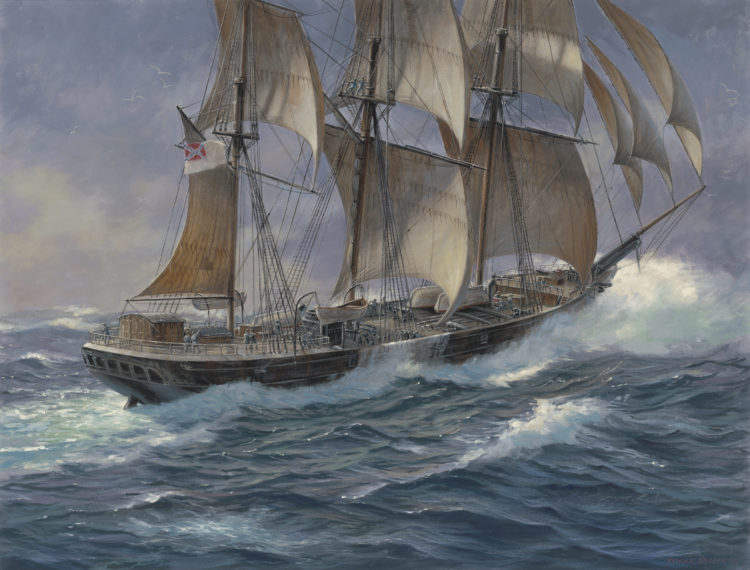Historians do not talk much about naval action during the Civil War, certainly not as much as they talk about ground combat. If it’s not about a riverboat, the Monitor, the Merrimack, or damning torpedoes, it just doesn’t get the same attention.
The CSS Shenandoah did a lot of things worth talking about.
Her flag was the last Confederate flag to be lowered and she was the ship that took the Civil War to the global stage. She looted and burned Union merchant shipping from Africa to India, Russia, and back.
She took 38 prizes and more than a thousand prisoners, some of them joining the Confederate ship.
Shenandoah was built by the British. She was a fast, steam-powered screw ship. The Brits transferred her to a Confederate skeleton crew under Capt. James Waddell off of the coast of Africa. From there, Shenandoah terrorized American ships in the sea lanes around the Cape of Good Hope, through the Pacific, and into the Bering Sea off Alaska.
At the time, however, Alaska belonged to the Russian Czar and the Czar was a friend of the United States. Thus, when Shenandoah began burning American whaling fleets in his territory, the Czar was not at all pleased.
Even after the Civil War was over, Shenandoah continued her Pacific rampage. The skipper just did not believe that Lee’s surrender ended the war, even when American whaling captains told him so.
Pretty soon, he was the only Confederate still fighting. So he moved to shell the defenseless city of San Francisco. It was on his way to California that he met a British ship which confirmed the news: The Confederacy was gone and the captain and crew of the Shenandoah were going to be tried and hanged.
Every Navy in the world was looking for Shenandoah. With a hefty bounty on his head, Capt. Waddell disguised the ship, stowed its weaponry, and made a mad dash for Great Britain — the long way around.
Out of major shipping lanes, he faced terrible weather. He also never contacted any ships or stopped in any port, steaming the Shenandoah 27,000 miles to Liverpool, England, where he surrendered to the Royal Navy in November 1865.
The USS Waddell, a guided-missile destroyer, was named after Shenandoah’s captain. Though not the first ship to be named after a Confederate, it was the first one to be named for an enemy captain who wreaked havoc on American shipping.
Already have an account? Sign In
Two ways to continue to read this article.
Subscribe
$1.99
every 4 weeks
- Unlimited access to all articles
- Support independent journalism
- Ad-free reading experience
Subscribe Now
Recurring Monthly. Cancel Anytime.











COMMENTS